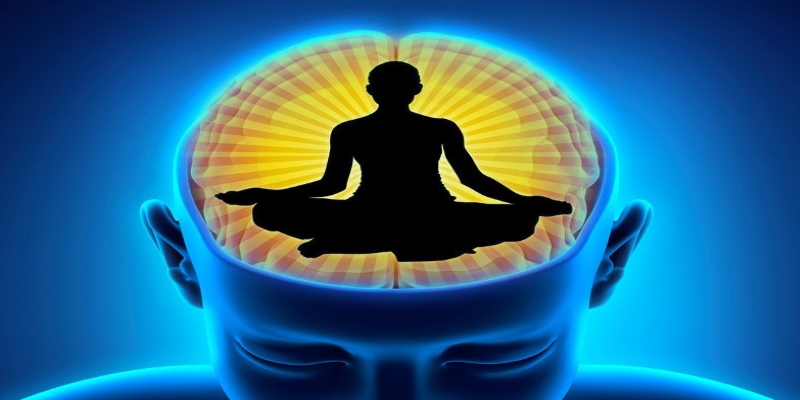
The Science Behind Meditation And Its Impact On Mental Health
 Mental Health & Spiritual Healing
Mental Health & Spiritual Healing Meditation has been practiced for thousands of years across different cultures, but in recent decades, its mental health benefits have gained increasing attention from scientists and healthcare professionals.
Meditation has been practiced for thousands of years across different cultures, but in recent decades, its mental health benefits have gained increasing attention from scientists and healthcare professionals. As interest in mental well-being grows, understanding the science behind meditation and how it affects the brain and body is becoming more important than ever. This article delves into the physiological and psychological mechanisms at play, offering a comprehensive look at why meditation is more than just a trend. From stress reduction to improved emotional regulation, meditation offers a range of mental health benefits that are supported by scientific evidence.
What Is Meditation?
Meditation is a practice that involves focusing the mind to achieve a state of relaxation and heightened awareness. It typically involves breathing exercises, mindfulness, or the repetition of a mantra, all of which aim to promote relaxation, clarity, and emotional stability. While there are many different types of meditation, they all share the goal of calming the mind and enhancing one's awareness of the present moment.

At its core, meditation is a tool for achieving a state of mental clarity and peace. Over time, research has shown that regular practice can positively impact both the brain and the body. These effects have been well-documented in various scientific studies, many of which have explored how meditation influences the brain's activity, its structure, and even how it reacts to stress and trauma.
The Brain And Meditation: How It Works
One of the most significant impacts of meditation is on brain function. Studies using brain imaging techniques like fMRI (functional Magnetic Resonance Imaging) have revealed that meditation can lead to measurable changes in the brain’s structure and activity.

One of the primary ways that meditation impacts the brain is through the regulation of the default mode network (DMN). The DMN is a network of brain regions that are typically active when the mind is at rest or "wandering." This network is often associated with negative thought patterns such as rumination, worry, and anxiety. Research shows that meditation helps reduce activity in this network, which in turn lowers the tendency to dwell on negative thoughts and emotions. This reduction in mind-wandering is linked to lower levels of stress and anxiety and can also help improve focus and concentration.
Moreover, meditation has been shown to increase the thickness of the prefrontal cortex, the region of the brain responsible for higher cognitive functions like decision-making, emotional regulation, and self-control. A thicker prefrontal cortex is associated with better emotional stability, enhanced attention, and improved cognitive flexibility. In other words, regular meditation can make it easier to manage one’s emotions and reactions, leading to a calmer, more controlled mental state. Meditation also affects the amygdala, the brain's center for processing emotions, especially fear and stress. Research has shown that people who meditate regularly have a smaller and less reactive amygdala compared to non-meditators. This means that meditation can help reduce the brain’s emotional response to stress, allowing individuals to remain more composed and less reactive in challenging situations.
Stress Reduction And Anxiety Management
Stress is a natural part of life, but chronic stress can have serious implications for mental health. Chronic stress is linked to a range of mental health issues, including anxiety, depression, and burnout. Meditation, however, offers a powerful way to manage and reduce stress levels.

Mindfulness meditation, in particular, has been shown to activate the parasympathetic nervous system—the body's "rest and digest" system—which helps to counteract the stress-induced fight-or-flight response. By promoting relaxation and calm, meditation helps to lower cortisol levels, a hormone produced by the body in response to stress. Elevated cortisol levels over long periods can lead to anxiety, depression, and other health problems. Through consistent meditation practice, the body's stress response is toned down, which reduces the overall levels of anxiety.
For people who suffer from chronic anxiety, meditation can provide a way to break the cycle of overthinking and constant worry. Mindfulness practices, which involve observing thoughts and emotions without judgment, help individuals create a more balanced perspective, reducing the intensity of anxious thoughts. By cultivating awareness of the present moment, meditation shifts focus away from future worries and past regrets, helping to keep anxiety at bay.
Emotional Regulation And Mental Clarity
Emotional regulation refers to the ability to manage and respond to emotional experiences in a healthy and controlled way. Meditation plays a key role in strengthening this ability, as it teaches individuals how to observe their thoughts and emotions without immediately reacting to them. This creates space between stimulus and response, allowing for more thoughtful, composed reactions rather than impulsive ones.

Studies have shown that meditation can help regulate emotions by increasing activity in areas of the brain that are responsible for empathy and emotional understanding, such as the anterior cingulate cortex and the insula. These regions help individuals process their own emotions as well as the emotions of others, which can lead to increased emotional intelligence. As a result, individuals who meditate regularly are better equipped to handle emotional challenges, whether it’s a stressful work situation or a difficult personal relationship.
Meditation also promotes mental clarity by quieting the constant stream of thoughts that often cloud our minds. This heightened awareness can help improve decision-making skills, increase focus, and enhance problem-solving abilities. With a clearer mind, individuals can tackle challenges with greater calm and precision, which not only improves mental performance but also contributes to better emotional well-being.
Meditation And Mental Health Disorders
Beyond its general benefits for mental well-being, meditation has shown promise in helping individuals with specific mental health disorders. People who suffer from conditions such as depression, PTSD, and ADHD have reported significant improvements in their symptoms after incorporating meditation into their treatment plans. For individuals with depression, meditation can help shift the brain's activity away from negative thought patterns. By reducing rumination and fostering a more balanced, mindful approach to thoughts and feelings, meditation can ease the cycle of depressive thinking. Some studies have found that meditation is as effective as antidepressant medications for some individuals, especially when combined with other forms of therapy.

Meditation has also been found to be an effective tool in managing post-traumatic stress disorder (PTSD). By encouraging mindfulness and emotional awareness, meditation helps individuals process traumatic memories in a way that reduces their emotional impact. It also helps to re-regulate the nervous system, promoting relaxation and reducing the heightened stress response often seen in PTSD. For those with ADHD, meditation can improve attention and reduce impulsivity. Research suggests that mindfulness meditation can help individuals with ADHD train their attention and improve focus, which are key challenges for those with this condition. Regular meditation practice can help develop the cognitive control necessary to stay focused and reduce distractibility.
Final Thoughts
Meditation is not just a relaxing practice but a scientifically supported tool for improving mental health. From reducing stress and anxiety to enhancing emotional regulation and mental clarity, the benefits of meditation are vast and well-documented. The impact on the brain, particularly in areas related to emotional processing, attention, and stress response, is profound. For those struggling with mental health challenges, meditation offers a complementary approach that can significantly improve quality of life. Whether practiced alone or as part of a comprehensive mental health plan, meditation’s ability to promote a calm mind and resilient body makes it an invaluable tool for mental well-being.
